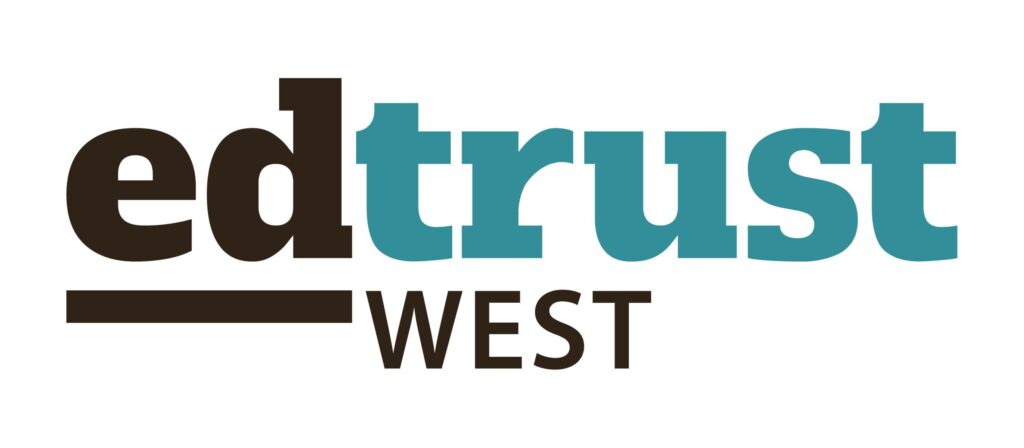On behalf of my colleagues at the EdTrust—West, I want to thank Senator Romero for organizing and hosting this informational hearing on the future of California’s Education.
To be sure, there are parts of this dialogue that are difficult with passionate and committed voices on either side of the debate. But keeping focused on the facts, we have to look at what we know to be true in our current climate—both in the nation and in our state.
We know that California’s schools and students were just forced to shoulder the burden of $5.3 billion dollars in cuts to their education. We know that the Federal government has issued regulations that will guide the distribution of the Race to the Top Funds. We also know that as it currently stands, the Administration has made it clear that California is not currently eligible to compete for those funds. And everyone in this room knows that we cannot—or rather our students cannot—afford for us to not do everything in our power to become not just eligible, but truly competitive for every available dollar.
President Obama and Secretary of Education Arne Duncan are providing unprecedented leadership and investment in education. They have laid out a series of ambitious goals for states, and charted a course toward bold reform. Indeed, Secretary Duncan has said that improving teacher quality is his “highest priority”. We couldn’t agree with him more.
Mountains of research tell us that our teachers are the single most important factor in the classroom. Knowing this, have we built an education system accordingly?
Do we have information about what teacher effectiveness truly is? Do we know which programs or approaches prepare the best teachers? Do our evaluation systems allow us to identify the great from the good, the effective from the ineffective? Do we have the ability to reward the best teachers among us? Do we know how best to support those who need help?
The answer, sadly, to all these questions is no. A firewall, codified in statue, prevents our knowing the answers to these questions. And while there are functional and fiscal considerations that call for tearing down this wall, our moral barometers should lead us there as well.
Standardized Testing and Reporting (STAR) data released last week by the California Department of Education reveal that while students overall are making small incremental increases in achievement, the gap between low-income students and students of color and their more advantaged peers remains wide, pervasive, and devastating. If we are truly serious about forever closing this gap and educating all students to the highest levels, we must also get serious about identifying which teachers are most effective in the classrooms and which ones need a little more help. If California’s schools are going to improve student outcomes and close the achievement gaps that persist between student groups, we need more—not less—critical information about what is happening inside of districts, schools and classrooms.
And while we agree employment decisions should happen at the local level, we feel strongly that the state must take a direct role in helping local leaders identify and reward the teachers or group of teachers who are most successful at raising student achievement.
The state has a central and critical role to play using student performance as part of teacher evaluation—a role that differs in important ways from the role a district plays in this process. The absence of state-level leadership enables local teachers unions to water down teacher evaluations at the collective bargaining table in each of California’s 1,050 school districts. And despite some of the current rhetoric, the truth is that only a handful of districts have actually implemented reforms to use student performance data as part of teacher evaluation. That is not nearly enough—not for the federal government, not for teachers who deserve recognition, and not for the students who have been poorly served by our school system.. The time is now for the state to step in and provide crucial guidance and support to our districts and schools.
California and the nation are standing on the precipice of what could be an historic change in the tide of education in our state. And this conversation must and should go beyond the firewall.
Indeed, we should be looking at how we can best use this unique—and brief—moment in time to enact powerful and lasting change to our educational system that will benefit our students and our state for generations to come.
For example, now would be an excellent time to start thinking about policies that ensure the equitable distribution of effective teachers and principals to make sure that low-income students and students of color and are not disproportionately taught by ineffective teachers.
Additionally, the Race to the Top funds presents an opportunity for the state to implement the recommendations of the McKinsey report. We have in our hands a roadmap offering a long-term plan for developing and implementing a comprehensive, integrated statewide data system. The data called for in the McKinsey report will allow us to identify what works and replicate it, or to diagnose what’s broken and fix it.
To be sure, the emerging federal role in education funding will not stop with the stimulus package. If we do not act now, it is very likely that California will continue to be excluded from lucrative funding opportunities for the next 4 to 8 years. State leaders and education stakeholders must ask themselves if this is a cost they are willing to ask our students to pay.
Testimony to the Senate Education Committee on Race to the Top

